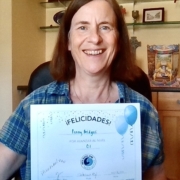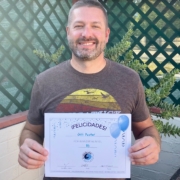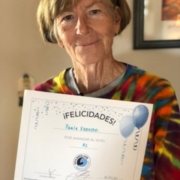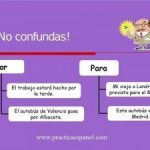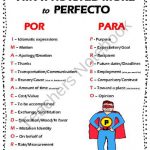5 Common errors made by Spanish learners
Common errors made by Spanish learners
Hola, estimados alumn@s :)
This week I’d like to talk about some errors that most students make. These erros are very common, because they are caused by the fact that English is the mother tongue of most of the Spanish learners that come to PBO. The problem is that students might not know that some structures that are correct in English, can’t be used exactly in the same way in Spanish. Let’s look at some of those mistakes:
,
1 – “La semana que viene estoy yendo a casa de mis padres.”
Next week I’m going to my parent’s house.
The sentence above in Spanish is not correct. In Spanish we only use the Present Continuous/Progressive (for example; I’m talking, you are sleeping, she is going) when the action is taking place in the present time. Therefore, using it for future actions is a mistake and we should avoid it. To express future actions, we have two options in Spanish:
“La semana que viene voy a ir a casa de mis padres.”
“La semana que viene iré a casa de mis padres.”
,
2 – “Después de tomé café fui a trabajar.”
After I had coffee I went to work.
In the case above, the problem is the conjugation of the verb “to have” in the past tense. In Spanish, verbs are never conjugated when they come after the words before (antes de) or after (después de), or any preposition for that matter, regardless of the time in which the action takes place. Instead, we use the non conjugated form of the verb:
“Después de tomar café fui a trabajar.”
,
3 – “Mañana tendré el desayuno y pasearé.”
This time, the problem is the fact that we are using the verb “to have” with a meal. In Spanish we don’t “have meals,” we have verbs that express the action of having breakfast, lunch, or dinner. Thus, we can use just one verb to express that. This is what you should say:
“Mañana desayunaré y pasearé.”
,
4 – “Me levanté a las 7 en la mañana.”
The mistake we see here is a small one, but I realized it’s hard to fix the habit of using it. Try to remember that in Spanish we never say “en” after a certain hour and before a time of the day. We should always say “de”:
“Me levanté a las 7 de la mañana.”
,
5 – “Lo siento, estoy tarde.”
When students are late to class, they usually say this. However, that is not the correct way to express that we are late. In Spanish, we are not late, we “arrive” late. Besides, in most cases we shouldn’t use the present tense once we get to a place, and we say that we are sorry for being late. We already “arrived”, so we use the past tense:
“Lo siento, llegué tarde.”
,
You probably know some of these mistakes, and I know it’s hard not to make them when we are talking. Try to challenge yourself to get used to not making one or two of the things we’ve looked at here today, and slowly you will not make those mistakes. In my opinion, the point is to pick only one or two and work on fixing the habit of saying those wrong. Over time, you’ll get used to saying them correctly, and then you can work on one or two other common mistakes. One step at a time, my friends! :)
,
Un abrazo a todos!
Octavi
PS Join us on Twitter for sayings/expressions/idioms in Spanish!




